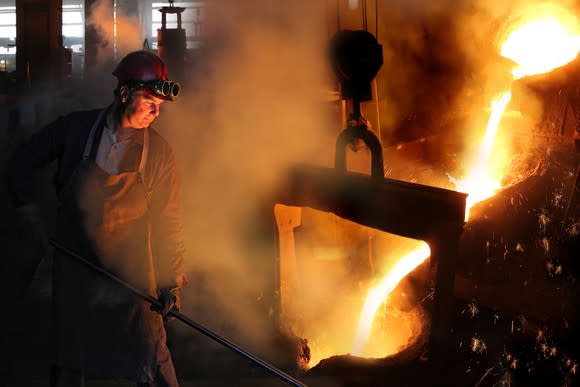Why an 11% Drop in This Industry Metric Is Huge News for Steelmakers
According to Nucor Corporation (NYSE: NUE) CEO John Ferriola, steel imports are down roughly 11% through the first nine months of 2018. That may not sound like a big change, but for the U.S. steel industry it's huge news. For a very long time, low-priced foreign imports had been a major headwind for companies like Nucor, Steel Dynamics, Inc. (NASDAQ: STLD), and iconic United States Steel Corporation (NYSE: X). Here's what the leaders of these companies had to say about this news and the changes that are being driven by the drop.
More than just imports, but they help
Nucor's third-quarter earnings were nothing short of impressive, with the giant U.S. steel mill on pace to set a full-year record for earnings in 2018. CEO Ferriola is quick to point out that a strong economy is the leading factor behind its impressive results, with 23 of the 24 markets it tracks either holding steady or seeing demand growth. However, he was sure to highlight the increasing benefit from the steel industry's efforts to push back against low-cost foreign imports. That includes trade-case wins and the current round of tariffs being imposed by the U.S. government, which the industry backed. According to Ferriola:
Together, these are removing artificially low-cost foreign imports from the market and restoring a level playing field.

Image source: Getty Images.
The share for steel imports was down to 24% of the market in the third quarter, from 28% in the same period a year ago. This has given Nucor enough confidence in the outlook for demand that it's currently working on nine projects worth more than $2 billion, including ground-up construction of new mills, and expansions and upgrades at existing facilities.
Getting back to work
U.S. Steel is another domestic steelmaker that views the tariffs as a big positive. And it's confident they're here to stay, with CEO David Burritt noting during the third-quarter conference call, "We believe that this administration is going to stay true to creating this fair trade environment."
The improvement on the import front was directly responsible for the company's plans to restart both furnaces at its Granite City Works in 2018. When pressed on the operating costs at the mill by an analyst during the third-quarter conference call, Burritt responded that the shutdown of the Granite City Works wasn't about costs:
The reason they were shut down before is simply related to absence of volumes and driven in large part by unfair trade.
With a more level playing field, U.S. Steel has been able to bring this mill back online and provide roughly 800 jobs in Illinois.
Sustainable support
Steel Dynamics was also quick to support the current administration's efforts, with CEO Mark Millett stating during the third-quarter conference call:
[T]he actions the U.S. federal government has recently made to develop a healthy domestic steel industry should provide sustainable long-term support for the U.S. manufacturing base.
That's an important backdrop to consider since the company plans to increase its capital spending by as much as 50% in 2019. Note, too, that the company bought Kentucky Electric Steel for $5 million earlier this year. The facility had been shut down by its previous owner, but Steel Dynamics intends to restart the rolling mill. There's no doubt that the drop in imports so far in 2018 helped to justify this use of capital.
We need more
The tariffs have been so successful, in fact, that at least one industry player would like to see more done. AK Steel Holding Corporation (NYSE: AKS) CEO Roger Newport noted during his company's third-quarter conference call that:
While we are encouraged with the trade progress, we remain concerned the electrical steel downstream products such as laminations, cores, and core assemblies that power our nation's electrical grid have yet to be included in the Section 232 remedies.
Electrical steel made up around 15% of the company's flat-rolled business in 2017, so it's an important sector for AK Steel. Based on the company's estimates, electrical steel imports more than doubled between 2014 and 2017 -- and look likely to be even higher in 2018. That AK Steel is agitating for expanding tariffs is a clear indication of the success that tariffs have had so far in other steel industry niches.
It's the economy, but tariffs help
As Nucor's Ferriola pointed out, imports alone aren't the driving force in the U.S. steel industry. Economic growth is far more important for the highly cyclical group. That said, the drop in imports is a key contributor to the improving business environment for companies like Nucor, Steel Dynamics, and U.S. Steel. The tariffs, at least in part, have helped them get more comfortable with investing in their businesses because there is less fear that subsidized steel from foreign countries will create an unfair playing field. While an 11% drop in imports isn't exactly a sea change for the domestic steel industry, it clearly indicates that things are getting better, and domestic mills are investing to take advantage of the shift.
More From The Motley Fool
Reuben Gregg Brewer owns shares of Nucor. The Motley Fool recommends Nucor. The Motley Fool has a disclosure policy.

 Yahoo Finance
Yahoo Finance 